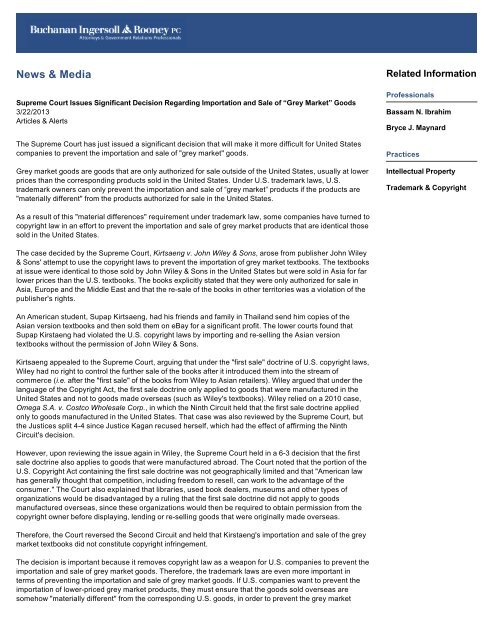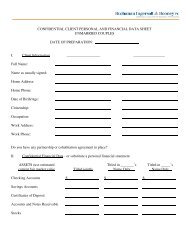Supreme Court Issues Significant Decision Regarding Importation ...
Supreme Court Issues Significant Decision Regarding Importation ...
Supreme Court Issues Significant Decision Regarding Importation ...
Create successful ePaper yourself
Turn your PDF publications into a flip-book with our unique Google optimized e-Paper software.
News & Media<strong>Supreme</strong> <strong>Court</strong> <strong>Issues</strong> <strong>Significant</strong> <strong>Decision</strong> <strong>Regarding</strong> <strong>Importation</strong> and Sale of “Grey Market” Goods3/22/2013Articles & AlertsThe <strong>Supreme</strong> <strong>Court</strong> has just issued a significant decision that will make it more difficult for United Statescompanies to prevent the importation and sale of "grey market" goods.Grey market goods are goods that are only authorized for sale outside of the United States, usually at lowerprices than the corresponding products sold in the United States. Under U.S. trademark laws, U.S.trademark owners can only prevent the importation and sale of “grey market” products if the products are"materially different" from the products authorized for sale in the United States.Related InformationProfessionalsBassam N. IbrahimBryce J. MaynardPracticesIntellectual PropertyTrademark & CopyrightAs a result of this "material differences" requirement under trademark law, some companies have turned tocopyright law in an effort to prevent the importation and sale of grey market products that are identical thosesold in the United States.The case decided by the <strong>Supreme</strong> <strong>Court</strong>, Kirtsaeng v. John Wiley & Sons, arose from publisher John Wiley& Sons' attempt to use the copyright laws to prevent the importation of grey market textbooks. The textbooksat issue were identical to those sold by John Wiley & Sons in the United States but were sold in Asia for farlower prices than the U.S. textbooks. The books explicitly stated that they were only authorized for sale inAsia, Europe and the Middle East and that the re-sale of the books in other territories was a violation of thepublisher's rights.An American student, Supap Kirtsaeng, had his friends and family in Thailand send him copies of theAsian version textbooks and then sold them on eBay for a significant profit. The lower courts found thatSupap Kirstaeng had violated the U.S. copyright laws by importing and re-selling the Asian versiontextbooks without the permission of John Wiley & Sons.Kirtsaeng appealed to the <strong>Supreme</strong> <strong>Court</strong>, arguing that under the "first sale" doctrine of U.S. copyright laws,Wiley had no right to control the further sale of the books after it introduced them into the stream ofcommerce (i.e. after the "first sale" of the books from Wiley to Asian retailers). Wiley argued that under thelanguage of the Copyright Act, the first sale doctrine only applied to goods that were manufactured in theUnited States and not to goods made overseas (such as Wiley's textbooks). Wiley relied on a 2010 case,Omega S.A. v. Costco Wholesale Corp., in which the Ninth Circuit held that the first sale doctrine appliedonly to goods manufactured in the United States. That case was also reviewed by the <strong>Supreme</strong> <strong>Court</strong>, butthe Justices split 4-4 since Justice Kagan recused herself, which had the effect of affirming the NinthCircuit's decision.However, upon reviewing the issue again in Wiley, the <strong>Supreme</strong> <strong>Court</strong> held in a 6-3 decision that the firstsale doctrine also applies to goods that were manufactured abroad. The <strong>Court</strong> noted that the portion of theU.S. Copyright Act containing the first sale doctrine was not geographically limited and that "American lawhas generally thought that competition, including freedom to resell, can work to the advantage of theconsumer." The <strong>Court</strong> also explained that libraries, used book dealers, museums and other types oforganizations would be disadvantaged by a ruling that the first sale doctrine did not apply to goodsmanufactured overseas, since these organizations would then be required to obtain permission from thecopyright owner before displaying, lending or re-selling goods that were originally made overseas.Therefore, the <strong>Court</strong> reversed the Second Circuit and held that Kirstaeng's importation and sale of the greymarket textbooks did not constitute copyright infringement.The decision is important because it removes copyright law as a weapon for U.S. companies to prevent theimportation and sale of grey market goods. Therefore, the trademark laws are even more important interms of preventing the importation and sale of grey market goods. If U.S. companies want to prevent theimportation of lower-priced grey market products, they must ensure that the goods sold overseas aresomehow "materially different" from the corresponding U.S. goods, in order to prevent the grey market
goods from being imported and sold in the U.S. in direct competition with the goods authorized for sale inthe United States.The threshold for a "material difference" under U.S. trademark laws is fairly low and can include differencesin the composition or ingredients of the product; differences in the language of the labels, stickers, orowner's manuals; differences in the availability of warranty coverage; and any other differences that wouldbe material to a U.S. customer.The other option is for copyright holders to price their goods in other countries close to what they would sellfor in the United States, in order to remove the incentive for grey market importers to import and re-sell theproducts in the United States. Some observers have already expressed concerns that by making it moredifficult for companies to prevent the importation of grey market goods, the decision could force thesecompanies to raise prices for creative works in other countries, thereby reducing the availability of textbooksand similar products in these countries (particularly in the developing world).© 2013 Buchanan Ingersoll & Rooney PC



